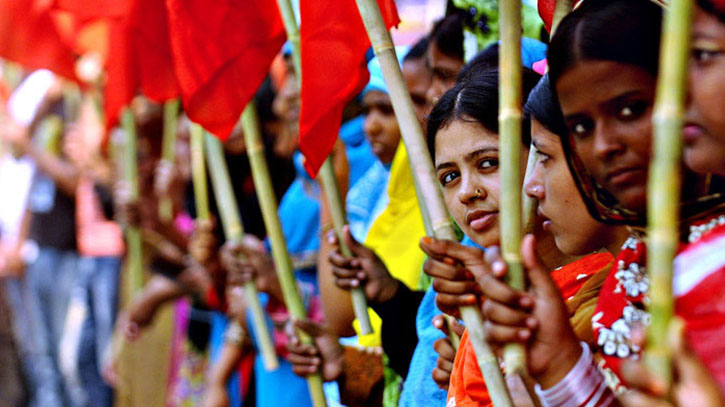
Since the fall of Sheikh Hasina’s government on August 5, 2024, and the rise of Dr. Yunus-led interim administration, the political and social landscape of Bangladesh has taken an U turn. Over the past six months, incidents that undermine women’s rights and freedoms have alarmingly increased, painting a grim picture of the country's march towards a regressive societal structure.
Two recent events which happened in the same week underscore this disturbing trend. The first incident involved journalist Amy Jannat, who was denied entry to the ‘Qawmi Entrepreneurs Conference 2025’ held at the China Friendship International Conference Center in Agargaon, Dhaka. Security personnel informed her that women were not allowed to enter the event where religion adviser AFM Khalid Hossain was present. This blatant act of gender discrimination sparked widespread debate on social media, with many questionings how such archaic rules could be imposed at a public gathering.
The second incident took place in Dinajpur and Joypurhat, where women’s football matches were forcibly stopped by members of the so-called ‘Tawheedi Janata’ or ‘agitated devotees.’ These incidents escalated to physical clashes, with fields being attacked and fences vandalized to prevent women from participating in sports. Even an event featuring popular actress Apu Biswas in Dhaka had to proceed without her due to pressure from similar religious groups.
These incidents are not isolated. They reflect a broader, systemic issue that has emerged under the Yunus-led government, which seems increasingly beholden to hardline religious elements. The administration’s inability—or unwillingness—to curb the rising influence of Islamist factions is deeply troubling. Despite assurances from the government that law enforcement agencies have taken steps to address these incidents, there is little evidence of meaningful action. Instead, the climate of fear and repression continues to grow.
At the heart of this crisis lies the question of accountability. Who are these 'Tawheedi Janata' and other groups disrupting public events and infringing on women’s rights? Why has the government failed to control their activities? The answers to these questions point to a dangerous political strategy: the tacit endorsement of conservative forces to consolidate power.
Dr. Yunus, once celebrated globally for his work in microfinance and social entrepreneurship, now finds his administration complicit in enabling a rollback of women’s rights in Bangladesh. The pro-Islamic stance of the interim government has emboldened extremist elements, who interpret the lack of state intervention as a green light for their regressive agenda.
This shift has profound implications for the future of Bangladesh. In the last few decades, the country made significant strides in women’s empowerment. Women occupied key positions in politics, business, and civil society. Initiatives were launched to promote girls' education, reduce child marriage, and improve maternal healthcare. The recent incidents threaten to undo these hard-earned gains.
The targeting of women journalists, athletes, and performers is symptomatic of a broader attempt to push women out of public spaces. This not only violates their fundamental rights but also undermines the socio-economic progress of the nation. A society that restricts women's participation is a society that hampers its own development.
What makes this situation particularly concerning is the government's apparent indifference. Instead of taking decisive action to protect women’s rights, the Yunus administration has adopted a policy of appeasement towards conservative forces. This is a dangerous precedent that could have long-lasting repercussions.
To counter this trend, several steps must be taken. Yes, the government press wing condemned the incident of Dinajpur and Joypurhat. But is this enough? We did not get a proper explainationr on Journalist Amy Jannat’s incident which happened in Dhaka. Need action against groups that disrupt public events and infringe on women’s rights. Law enforcement agencies should be empowered to deal with these incidents swiftly and decisively.
Secondly, civil society must play a more active role in defending women’s rights. Media organizations, NGOs, and activists must come together to raise awareness and hold the government accountable. The voices of women like Amy Jannat must be amplified, and their courage celebrated.
Lastly, it is crucial to foster a national dialogue on the importance of women’s rights and gender equality. Religious leaders, community elders, and educators should be engaged in this conversation to promote a more inclusive and tolerant society.
The current trajectory is unsustainable. Bangladesh cannot afford to regress into a state where women are marginalized and excluded from public life. The legacy of Dr. Yunus, once a beacon of hope for poverty alleviation, is now at risk of being overshadowed by his administration’s failure to uphold basic human rights.
The people of Bangladesh have a proud history of fighting for their rights. From the Liberation War to the movements for democracy, they have shown resilience and determination. It is time for that spirit to rise again—this time to defend the rights and dignity of women.
The Yunus administration must choose which side of history it wants to be on. Will it continue to enable the forces of repression, or will it stand up for the values of equality and justice? The answer to this question will determine not only the fate of Dr. Yunus’s government but also the future of Bangladesh as a progressive and inclusive nation. The time for action is now. Bangladesh's women deserve nothing less.
Siam Sarower Jamil is PhD Research Scholar at University of Delhi. He can be reached at [email protected]








